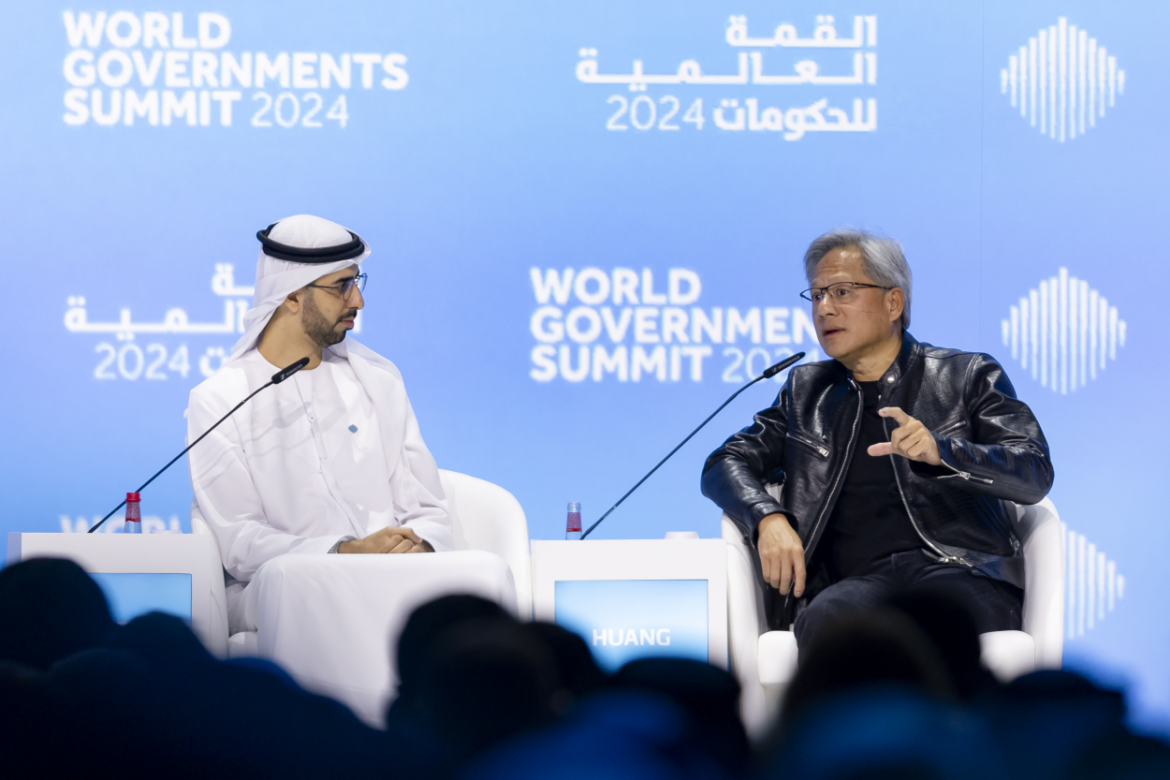Over 4,000 delegates have descended on Dubai for the World Governments Summit, welcomed with heavy rains and thunderstorms.
With attendees ranging from government officials and AI leaders to sustainability innovators and NGO heads, key themes from the first day spanned civilisation and conflict, AI’s evolution, global health challenges, sustainability and climate action.
ESG Mena shares the key insights from across day one and fills you in on what you might have missed.
Civilisation and conflict
Opening day one, H.E. Mohammed Al Gergawi, UAE’s Minister of Cabinet Affairs and Chairman of the World Governments Summit, said that the world is living in what he called “the best, safest and most prosperous human era.”
And, while on paper, when measuring certain metrics, this might appear true, it, of course, doesn’t account for the intensifying climate crisis and its wide-reaching impacts, the highest conflict death toll this century, and the ‘supercharged’ rich-poor gap.
Indeed, aimed at international cooperation, in 2024, WGS takes place in a world divided.
However, when framing the summit, Al Gergawi did note: “We are not overly optimistic or delusional. Rather, we have our feet on solid ground. We are well aware of our surroundings and keen to address all challenges.”
And there are many challenges that must be addressed, and many mistakes from which to learn. This was something stressed by numerous individuals across the day; troubling figures on the cost of conflict were also shared, highlighted to amount to $17 trillion in one year.
“This was not invested in construction, education and health, but in wars, sabotage and destruction,” he said. “Six percent of this number could cover the cost of the most important challenges facing humanity in one year.”
“For example, it could eliminate hunger and literacy, treat cancer and provide clean water to humanity. Imagine what could be achieved if we invested more in addressing other challenges facing humanity,” he added.
Of course, the devastating human cost of conflict has also been demonstrated across both 2023 and 2024, and today, WHO Director-General Tedros Adhanom Ghebreyesus called for a ceasefire in Gaza.
AI and the digital landscape
Elsewhere, on human civilisation and progress, founder and executive chairman of the World Economic Forum, Klaus Schwab, called for a move to “humanocracy.”
“If we look forward, we don’t want to move into using the Fourth Industrial Revolution into a cold bureaucracy. We don’t want to move into a technocracy. What we want to do…. we want to move for what I would call a “humanocracy,” a world where we use technology to use all our human potential and to create even a better world,” he said.
Indeed, the evolution of technology and its impact on humanity was in the spotlight today, with tech titans and AI experts gathering at the summit.
In one session, Nvidia CEO Jensen Huang called for each country to build its own artificial intelligence infrastructure and protect its “data sovereignty.”
Meanwhile, the US-UAE Business Council launched a report which provides a comprehensive overview of the UAE’s AI ambitions.
Further to this, the UAE launched a $200 million fund to provide cutting-edge technology to developing countries. The fund will be financed by the Abu Dhabi government and overseen by the Advanced Technology Research Council (ATRC).
However, alongside these talks around AI’s progress and potential, sessions also underlined the need for regulation and the prioritisation of ethical AI.
This was highlighted by Schwab, who called for the creation of ethical frameworks to regulate AI.
Global health & pandemic preparation
Also in focus today was global health, and in one session, ‘A Pact with the Future: Why the Pandemic Agreement is Mission-Critical for Humanity’, Dr Tedros Adhanom Ghebreyesus called for preparation for the next pandemic.
“Exactly six years ago, I said the world was not prepared for a pandemic and expressed my concern at that time that a pandemic could happen any time,” he said, adding: “Less than two years later, the Covid-19 pandemic struck, and the world is still not prepared today.”
Dr Tedros Adhanom Ghebreyesus warned that the lessons learned in the pandemic are in danger of being forgotten as attention turns to the many other crises confronting the world.
“But if we fail to learn those lessons, we will pay dearly next time – and there will be a next time. The cycle of panic and neglect is beginning to repeat,” he said.
He subsequently called for leaders to commit to the treaty when the World Health Assembly convenes in May.
The treaty has, however, been subject to a number of criticisms, including on its failure to enshrine core human rights standards protected under international law, in particular, the right to health and the right to benefit from scientific progress.
Sustainability, climate finance, and ramping up action
Taking place in the second Year of Sustainability, climate and environment was another focal point throughout the summit.
During day one, for example, it was noted that climate financing needs in the Middle East and Central Asia could potentially hit $3 trillion by 2030. These figures were put forward by a new IMF report titled ‘Preparing Financial Sectors for a Green Future.’
Elsewhere at the event were conversations on sustainable mobility, and green energy.
H.E. Juan Carlos Salazar, Secretary General of the International Civil Aviation Organization (ICAO), for example, described the organisation’s development of alternative aviation fuels.
“We are working hard to develop sustainable fuel technology and implement incentivizing policies to promote its use. This will help cut carbon dioxide emissions and achieve sustainability goals in the aviation sector. We, in the organization, believe that this path represents a brilliant future for the aviation industry and will boost local and global economies,” said Salazar.
A major partnership between the UAE, Azerbaijan and Brazil was also launched, with the aim of maintaining what was called “mission 1.5ºC”.
ESG Mena is on the ground at the summit providing coverage on all the latest updates from the event.




